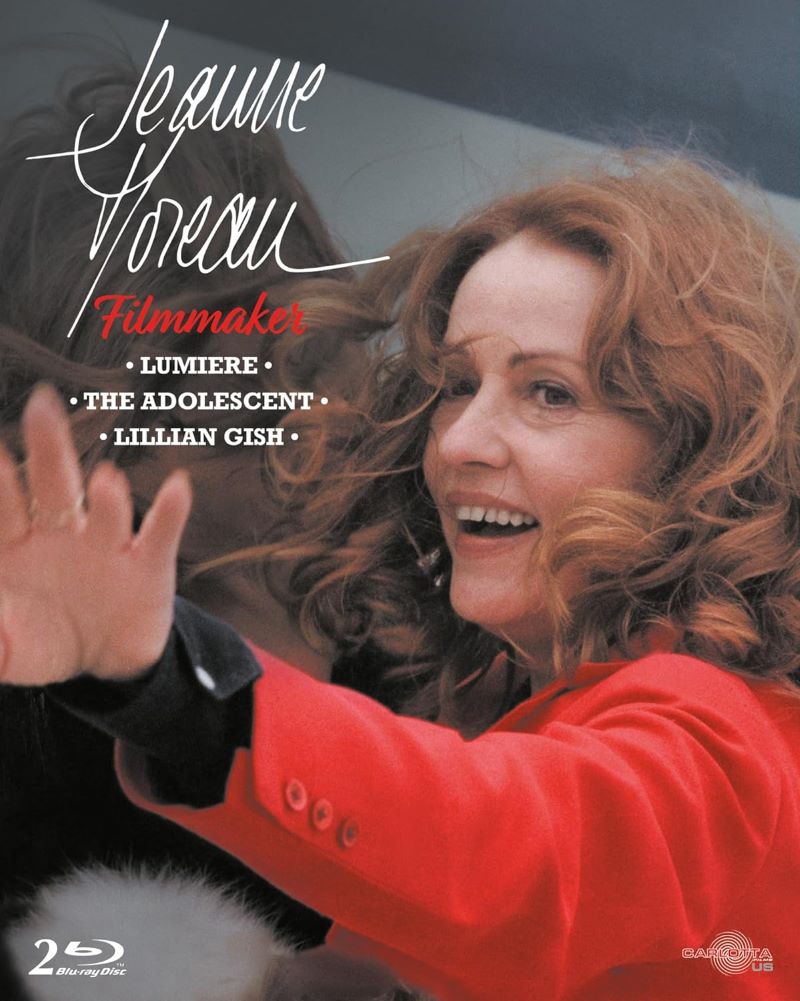
Any casual fan of French cinema recognizes the name of esteemed actress Jeanne Moreau. Of far less common knowledge is her side career as a filmmaker, both as screenwriter and director. This new Blu-ray set shines a light on her most notable directorial works: the narrative features Lumiere and The Adolescent, and the documentary Lillian Gish.
Buy Jeanne Moreau, Filmmaker Blu-rayLumiere (1976) works best in its opening scenes of a gathering of girl friends at a country estate. Two older friends (Moreau and Lucia Bose) and their two young friends relax around a pool as they discuss the men in their lives, something like a multi-generational Sex and the City. The film loses steam when it rewinds a year to show their lives in the city as they navigate the clutches of the assorted men in their orbits, although it’s fun to see the big feathered hair and ‘70s fashions and a brief appearance by Keith Carradine. As the film’s sole writer, director, and star, Moreau may have bitten off a bit too much for her first try, but the film shows great promise in its female-centric scenes.
The Adolescent (1979) shows Moreau as a more disciplined filmmaker, keeping a steady hand on her charming semi-autobiographical tale of the last peaceful summer spent in the idyllic French countryside before the outbreak of World War II. The focus is on a tween girl coming of age that summer, grappling with her feelings about falling in love with a 30-year-old doctor who is more interested in pursuing an affair with her mother. Moreau stays behind the camera for this one, a wise choice that allows fellow screen legend Simone Signoret to shine as the most notable star, grandmother to the tween character. Signoret plays a role similar to her work in The Burned Barns opposite Alain Delon, a sage and all-seeing matriarch of an insular village.
Lillian Gish (1983) is a documentary about the groundbreaking silent film actress produced while Gish was still alive. Moreau acts as our tour guide through the career of this trailblazing artist, first filming herself as she nervously preps to go interview Gish in her Manhattan apartment, then engaging in a free-wheeling one-on-one conversation with her. Rest assured that the nonagenarian Gish is still completely competent throughout the chat, relaying her amazing tales about the earliest days of Hollywood with a strong voice and a keen twinkle in her eye.
Moreau narrows her focus solely to Gish’s principal screen career up to the Depression era, making for a bit of an abrupt ending as we’re left wondering about what happened in the intervening half century. Still, Gish paints an enthralling portrait of early American film, covering her lengthy time in D.W. Griffith’s troupe including the notorious The Birth of a Nation, her bombshell that the film industry would have been centered in Florida but for Griffith’s snap decision to try California, and her revelation that she declined her invitation to be one of the founders of United Artists. I wasn’t expecting much from this film, but it is absolutely essential viewing and easily the best of the set.
All three films have been recently restored, with Lumiere and The Adolescent receiving 4K restorations and Lillian Gish in HD. The results are impressive, with super clean and precise images and clear single-channel DTS-HD Master Audio soundtracks.
Supplemental footage is included for all three films, providing a wealth of exceptional insight. Lumiere’s bonus is a 13-minute interview with Moreau produced while she was on location making her film. The Adolescent has three different check-ins with Moreau, two while on location and one while she was editing the film. Yes, Moreau was so involved that she was actually in the editing bay cutting and splicing the film herself. The best feature is on the Lillian Gish disc: a half-hour interview by Moreau with Clint Eastwood that serves as something of a bonus track to the hour-long Gish interview. Eastwood and Moreau convivially compare notes about their lengthy screen careers during a leisurely chat prior to Eastwood’s duties as jury president at the 1994 Cannes Film Festival, a fascinating meeting of movie titans.
Although the three films seemingly have little in common, the throughline is Moreau’s focus on strong, supportive female relationships. She’s at her best when fostering these playfully encouraging connections, from the gleeful girlfriends in Lumiere to the grandmother/granddaughter support system in The Adolescent, to the warm meeting of screen legends in Lillian Gish. That sense of Moreau’s support and amplification of girl power even comes through in the on-location bonus features, making her ascendance to the positions of screenwriter and director all the more notable in spite of its overall rarity. If you only know Moreau from her work inhabiting other characters, this new set clearly reveals the strength and warmth of her true personality.